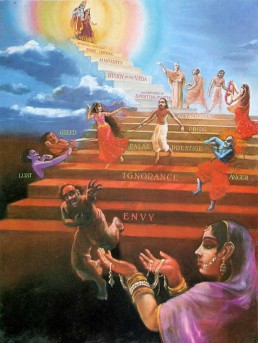This verse concludes the discussion started with the statement ‘all this is strung in Me as a row of pearls on a thread’. All things (including the different states of mind) are in The Lord but He is not in them just as all waves are in the ocean but the ocean is not in them. The universe is only an appearance superimposed by illusion (Maya) on the Lord. It is like a mirage in the desert. From the standpoint of the onlooker, the illusory water exists in the desert; but the desert does not depend upon or exist in the mirage. Likewise this universe, apparently superimposed on the Lord, exists in the Lord, but the Lord is not in the universe. None of the properties of the universe touches the Lord, just as the waters of the mirage cannot soak a single grain of the desert sand.
The gunas constitute prakriti or nature which is the lower manifestation of the Lord. Therefore the Lord is their ultimate cause. But the Lord is not, as in the case of worldly men, under the control of the gunas. The gunas, on the contrary, are subject to Him.
GUNAS
A reference to the gunas was made by Krishna in the Gita earlier vide Chapter 2 verse
45. In the beginning of this Chapter we have seen the Lord is of two kinds of nature viz, Purusha and Prakriti. Thee former denotes the Soul or Consciousness and the latter Nature or matter, which is dull and insentient. Prakriti consists of three gunas namely, sattva, rajas, and tamas. Rajas denotes restlessness or active principle. Tamas is the principle of inertia and Sattva, serenity and harmony, is the equilibrium between rajas and tamas. As prakriti consists of the three gunas, every object in prakriti is compounded of these three gunas. Samsara is the realm of the gunas. Freedom is beyond these gunas.
Prakriti is not independent of the Lord. Everything constituted by the three gunas is in no sense a self-dependent essence independent of God but springs from Him alone. While He contains and comprehends all, they do not contain and comprehend Him. This is the distinction between God and His creatures. They undergo changes because of the divine but their changes do not touch the integrity of the Divine. The lord is not subject to any one else, while all things are subject to Him.
Matter exists because of Spirit and Spirit is never restrained or regulated by the finite matter. The three Gunas – Sattva, Rajas and Tamas – which are temperaments or nature of the head and heart, by which the instruments of feeling, thinking and action come to play their role everywhere, rise from the Self.
MODES OF NATURE CONFUSE MEN

